Curated OER
Flag Grab
Students practice moving safely around their classmates. In groups, they practice evading and dodging others while trying to pull their flags off their belts. To end the lesson, they re-enter the game with new flags and follow the...
Curated OER
2 Ball Bop
Students observe and demonstrate striking, tossing, and fielding techniques to improve their baseball and softball skills. In small groups they participate in an activity in which a tosser throws two balls to a batter, while the batter...
Curated OER
Wind Power: From Eyesore to Energy
Young scholars design their own wind turbine according to client's needs. In this science and technology lesson, students analyze the pros and cons of using wind power. They construct a model of their proposed wind turbine and present it...
Curated OER
The Chemistry of Coal
Students investigate the chemistry of coal. This lesson serves as a review of conservation of mass, simple reactions and equation balancing. During the lesson, students research chemical components of coal, as well as environmental...
Curated OER
A FOREST'S PLACE IN OREGON
Students engage in a lesson to find the purpose for the forests of Oregon. The role of the forest is researched according to different geographic perspectives. The information is portrayed in graphs and presented by group members to...
Curated OER
Traveling the Transcontinental from Yesterday to Today
High schoolers examine the impact of the train on the physical landscape and spatial organization of America. They read and analyze various poems, analyze maps, and develop a list of the positive and negative changes brought by the...
Curated OER
Planet Earth
Students explore and analyze data from different maps in order to explain geographic diversity among the continents. Student groups research continents' physical features and examine how they contribute to quality of life for inhabitants.
Curated OER
The Heartland
Students note how personal perceptions influence the understanding of what a region. They look at an agricultural map of what is considered to be the Heartland of the US. They read the words to George Strait's, America's Heartland to see...
Curated OER
Weather and its Effect on the Environment and Settlement
Students, after choosing two diverse cities, collect data on weather for a month and construct a graph on temperature and precipitation. After collecting population data of said cities, and graphing it, they plot population on a large...
Curated OER
Scenes from Cameroon
Students examine art by a Peace Corps volunteer in Cameroon. Using the artwork, they identify three physical land features. They use sand and other materials to create their own day or evening scene in Cameroon. They share their...
Curated OER
Maui: People, Places and Patterns
Students predict patterns of growth on the island of Maui, complete a research paper on Maui using one of the geographic perspectives, and share their findings with others through an oral and written report.
Curated OER
Intergenerational Life Writing Lesson Plan
Young scholars meet with an older adult to complete a writing assignment. Using a topic suggested by the teacher, they each write a story about their own lives and compare and contrast their perspectives. They share their viewpoints...
Curated OER
1906 Earthquake
Pupils explore the impact of the 1906 earthquake on the population of San Jose. They explore two different perspectives of earthquakes. Students write a news bulletin as if they were reporting on the earthquake. They are then divided...
Curated OER
Most Wonderful Gift
Learners discover that folktales reveal a great deal about the place in which they originate. They identify physical and human characteristics of a place and explain how culture influences the way people think. They illustrate cultural...
Curated OER
Mystical Chinese
Students explore various Chinese beliefs about the environment. Using the internet, they research the characteristics of Feng Shui. They discuss how human actions modify the physical environment and vice versa. They discover how the...
Curated OER
Gaining Familiarity with Magnetism
Students discuss their perceptions of magnetism and explore the background ideas of magnetism.
Curated OER
World Geography: Who am I?
Students are able to provide a basic description of one country that has arsenic in its water supply. They are able to locate these countries on a map. Students explore the majors countries that have been affected by arsenic...
Curated OER
Mammals, Mammals--Everywhere!
Students explore the habitats of mammals and their physical characteristics. They research examples of mammals that must deal with daily changes in their habitat and how they cope with them. In small groups, students create a table...
Curated OER
Industrialization of the American Landscape - Major Project
Students consider the role of industry on the American landscape from a variety of perspectives. They investigate a simulated case study. They investigate a chemical spill catastrophe. Students write an informative pamphlet to assist...
Curated OER
A Mixed Bag of Apples
Middle schoolers recognize that individuals and groups have both common and different attributes and that each individual may be a member of many different groups. They recognize, appreciate and value individual differences and...
Curated OER
The Box
Tenth graders identify and interpret the perceptions of guilt and innocence. Then they explore the concept of ownership and think about the use of space as it relates to these terms. Students also use Freeze Frames, Mime and Facial...
Curated OER
Puppets and Tolerance
Students study tolerance in a puppet activity. In this tolerance lesson, students watch a puppet performance to learn about tolerance, diversity, and understanding.
Curated OER
"For the Birds" [part I]
Young scholars identify birds that appear in Chinese and Japanese art, learning about
their physical characteristics, classifying them according to scientific principles, and exploring their habitats and migration patterns. This is part...
Curated OER
Plastics and Rubber: What's the Difference?
Students observe how to classify things into groups based on physical properties. In this plastic and rubber lesson students group and sort items to help them to better identify properties.









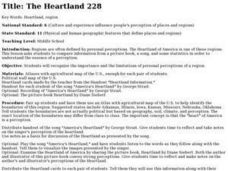
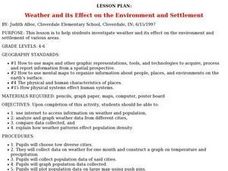
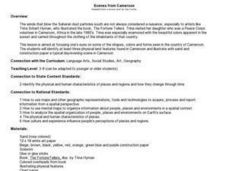




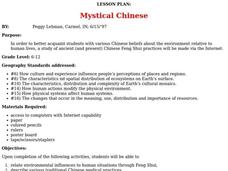



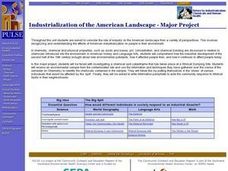

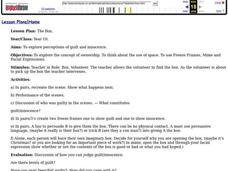
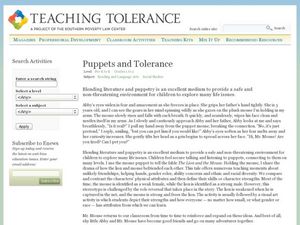
!["For the Birds" [part I] Lesson Plan "For the Birds" [part I] Lesson Plan](http://content.lessonplanet.com/resources/thumbnails/122462/large/cgrmlwnvbnzlcnqymdeymtaxny0ynji5lwd4n2h5by5qcgc.jpg?1414222903)
